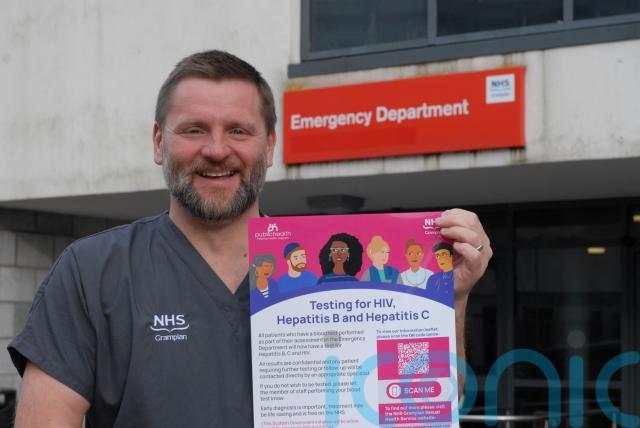
Patients treated at Aberdeen Royal Infirmary’s emergency department will routinely be tested for blood-borne viruses including HIV in a Scottish first.
It comes after a pilot scheme last year found around one in 180 patients tested had a previously undiagnosed blood-borne virus (BBV).
Medical experts said detecting HIV, Hepatitis B and Hepatitis C early can be lifesaving as they are treatable – but if left undiagnosed they can lead to serious illness and, in some cases, death.
Patients who have a blood test as part of their care at the hospital will now be tested for BBVs, unless they choose to opt out.

The Scottish Government said the scheme will be rolled out across the Lothian and Glasgow areas by next March.
Gareth Patton, a consultant in emergency medicine at NHS Grampian, said: “We found around one in 180 patients tested had a previously undiagnosed BBV and it allowed us to link that patient to specialist care – in many cases before they were showing any symptoms.
“Patients with BBV infections are often asymptomatic in the early stages, so there are people living with them who aren’t aware. The only way to find out if someone has a BBV is to carry out a test.
“Across the globe and locally, there is ongoing transmission of all three BBVs, often with cases of late diagnosis.
“Our initiative is part of a Scottish Government drive to eliminate Hepatitis C, end new transmissions of HIV, and treat people living with Hepatitis B.
“The project gives our staff an opportunity to make a positive impact by ensuring people are diagnosed and treated far sooner than they otherwise would have been, and it results in no additional time spent in our ED or increased waits for patients.”
The health board said effective treatment for HIV means people can have an undetectable viral load and live a healthy life span, while Hepatitis C can be treated and cured with a short course of tablets. Hepatitis B can be treated to ensure the patient can stay healthy.
Daniela Brawley, sexual health consultant at NHS Grampian, said: “We are very excited to be the first board in Scotland to offer this service, out-with a pilot setting.
“We found a higher prevalence than we thought we would during the trial, and it will be interesting to monitor that in the longer term.
“As well as early diagnosis having a great benefit to individuals, treating BBVs early also has a public health benefit in terms of reducing ongoing transmission, and a financial benefit to the NHS as patients diagnosed earlier are less unwell and require less treatment for complications of BBVs.”
Public health minister Jenni Minto welcomed the initiative, which launched this week.
She said: “We have made a huge amount of progress towards eliminating HIV and viral hepatitis in Scotland, expanding testing further helps us towards that goal as well as ensuring people are diagnosed early.
“Early diagnosis reduces transmission and improves clinical outcomes for people.
“I am heartened that we have been able to expand funding to enable NHS Grampian to participate in this rollout following their successful pilot.
“This lifesaving initiative will also be rolled out across the Lothian and Glasgow areas by March and will expand further if the evidence supports it.”
Subscribe or register today to discover more from DonegalLive.ie
Buy the e-paper of the Donegal Democrat, Donegal People's Press, Donegal Post and Inish Times here for instant access to Donegal's premier news titles.
Keep up with the latest news from Donegal with our daily newsletter featuring the most important stories of the day delivered to your inbox every evening at 5pm.